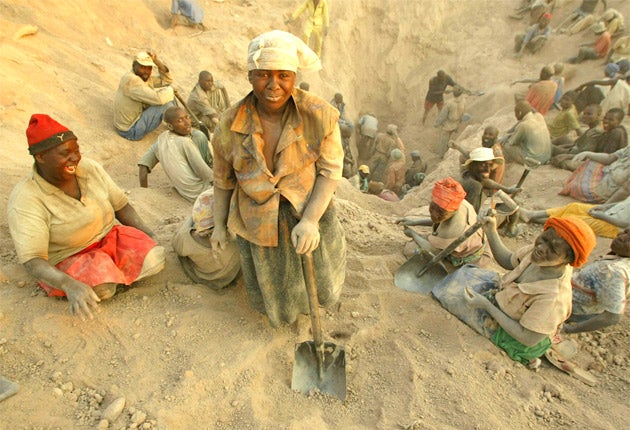Diamond auction brings Zimbabwe £1.2bn pay day

Your support helps us to tell the story
From reproductive rights to climate change to Big Tech, The Independent is on the ground when the story is developing. Whether it's investigating the financials of Elon Musk's pro-Trump PAC or producing our latest documentary, 'The A Word', which shines a light on the American women fighting for reproductive rights, we know how important it is to parse out the facts from the messaging.
At such a critical moment in US history, we need reporters on the ground. Your donation allows us to keep sending journalists to speak to both sides of the story.
The Independent is trusted by Americans across the entire political spectrum. And unlike many other quality news outlets, we choose not to lock Americans out of our reporting and analysis with paywalls. We believe quality journalism should be available to everyone, paid for by those who can afford it.
Your support makes all the difference.Zimbabwe began a hugely controversial diamond auction yesterday, the first of its kind since the partial lifting of an international export ban on the country. Private jets delivered buyers from India, Israel, Russia, Lebanon and the US amid tight security at Harare international airport.
The gems on sale come from the Marange fields where miners were massacred by soldiers and villagers have been beaten, raped and forced to work as virtual slaves. The human rights abuses, which began in 2008 when the army took over the fields forcing out tens of thousands of small-scale miners, led to Zimbabwe's being suspended from the Kimberley Process – an international body set up to prevent the trade in "blood diamonds".
Estimates of the value of the sale vary from £48m to £1.2bn as the quality of the gems is unknown. Zimbabwean officials had until recently insisted the diamonds were only fit for industrial use but some sources have indicated they may be as valuable as Lesotho stones which sell for $900 (£575) a carat. Abbey Chikane, the Zimbabwe monitor from the diamond control body, said 900,000 carats that met the minimum international standards had gone on sale.
Zimbabwe's government has rejected accusations of systematic rights abuses and its minister of mines yesterday accused foreigners of "peddling lies" about events at the Marange fields.
However, an investigation team sent by the international diamond body found that the gems were being mined by forced labour told to dig or die by security forces who were also involved in systematic smuggling.
Human Rights Watch says children as young as 10 were forced to work up to 11 hours a day in the diamond fields with no pay or reward. The organisation said it had reason to believe that at least 300 children were still working there in February 2009.
Instability in Zimbabwe has been seen as a critical test for the credibility of the Kimberley Process, originally set up to break the link between diamonds and conflict in West Africa. Fellow governments have refused to call the Marange gems "blood diamonds".
A last-ditch agreement to allow limited exports under the diamond certification process was reached last month under which Zimbabwe committed itself to tougher oversight in return for the chance to stage a one-off auction.
"It is historic in that we have managed to satisfy the minimum requirements of the Kimberley Process," said Morgan Tsvangirai, the former opposition leader who is Prime Minister in Zimbabwe's power sharing government.
"We have put in place measures to ensure that we abide by the Kimberley Process principles and sell our diamonds in a transparent manner."
If the sale does raise the upper estimates, that would be equivalent to one-third of the country's national debt. Finance Minister Tendai Biti, an ally of the prime minister, has called for greater transparency over diamond revenues amid fears that corrupt politicians will loot the proceeds.
Nadim Kara, from the Partnership Africa Canada (PAC) that pioneered the original certification process, said: "The eyes of the world are going to be on the sale. Both on what happens in terms of systematic abuses at the diamond fields and how the money is spent."
Join our commenting forum
Join thought-provoking conversations, follow other Independent readers and see their replies
0Comments